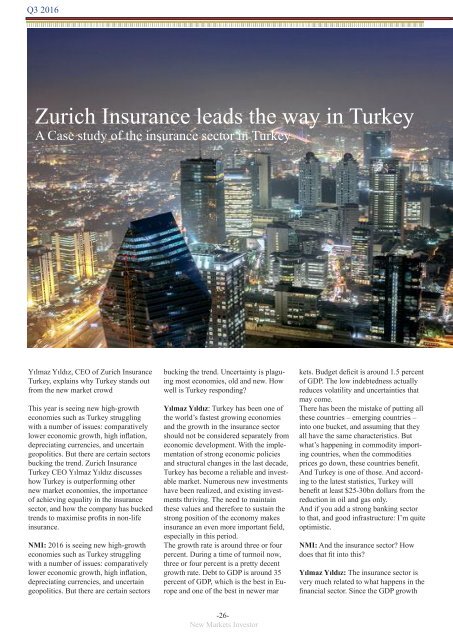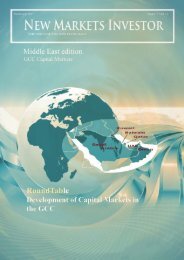Q4 2018 New Markets Investor
The magazine targets an audience of corporate and private investors, but its lucid voice makes it intelligible and essential reading for anybody who wants to understand investment strategies and markets in the 21st century.
The magazine targets an audience of corporate and private investors, but its lucid voice makes it intelligible and essential reading for anybody who wants to understand investment strategies and markets in the 21st century.
You also want an ePaper? Increase the reach of your titles
YUMPU automatically turns print PDFs into web optimized ePapers that Google loves.
Q3 2016<br />
Zurich Insurance leads the way in Turkey<br />
A Case study of the insurance sector in Turkey<br />
Yılmaz Yıldız, CEO of Zurich Insurance<br />
Turkey, explains why Turkey stands out<br />
from the new market crowd<br />
This year is seeing new high-growth<br />
economies such as Turkey struggling<br />
with a number of issues: comparatively<br />
lower economic growth, high inflation,<br />
depreciating currencies, and uncertain<br />
geopolitics. But there are certain sectors<br />
bucking the trend. Zurich Insurance<br />
Turkey CEO Yılmaz Yıldız discusses<br />
how Turkey is outperforming other<br />
new market economies, the importance<br />
of achieving equality in the insurance<br />
sector, and how the company has bucked<br />
trends to maximise profits in non-life<br />
insurance.<br />
NMI: 2016 is seeing new high-growth<br />
economies such as Turkey struggling<br />
with a number of issues: comparatively<br />
lower economic growth, high inflation,<br />
depreciating currencies, and uncertain<br />
geopolitics. But there are certain sectors<br />
bucking the trend. Uncertainty is plaguing<br />
most economies, old and new. How<br />
well is Turkey responding?<br />
Yılmaz Yıldız: Turkey has been one of<br />
the world’s fastest growing economies<br />
and the growth in the insurance sector<br />
should not be considered separately from<br />
economic development. With the implementation<br />
of strong economic policies<br />
and structural changes in the last decade,<br />
Turkey has become a reliable and investable<br />
market. Numerous new investments<br />
have been realized, and existing investments<br />
thriving. The need to maintain<br />
these values and therefore to sustain the<br />
strong position of the economy makes<br />
insurance an even more important field,<br />
especially in this period.<br />
The growth rate is around three or four<br />
percent. During a time of turmoil now,<br />
three or four percent is a pretty decent<br />
growth rate. Debt to GDP is around 35<br />
percent of GDP, which is the best in Europe<br />
and one of the best in newer mar<br />
kets. Budget deficit is around 1.5 percent<br />
of GDP. The low indebtedness actually<br />
reduces volatility and uncertainties that<br />
may come.<br />
There has been the mistake of putting all<br />
these countries – emerging countries –<br />
into one bucket, and assuming that they<br />
all have the same characteristics. But<br />
what’s happening in commodity importing<br />
countries, when the commodities<br />
prices go down, these countries benefit.<br />
And Turkey is one of those. And according<br />
to the latest statistics, Turkey will<br />
benefit at least $25-30bn dollars from the<br />
reduction in oil and gas only.<br />
And if you add a strong banking sector<br />
to that, and good infrastructure: I’m quite<br />
optimistic.<br />
NMI: And the insurance sector? How<br />
does that fit into this?<br />
Yılmaz Yıldız: The insurance sector is<br />
very much related to what happens in the<br />
financial sector. Since the GDP growth<br />
-26-<br />
<strong>New</strong> <strong>Markets</strong> <strong>Investor</strong>









